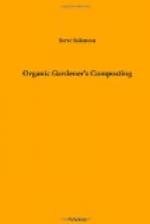Fertilizing Vegetables with Compost
Will a five ton per acre addition of compost provide enough nutrition to grow great vegetables? Unfortunately, the answer usually is no. In most gardens, in most climates, with most of what passes for “compost,” it probably won’t. That much compost might well grow decent wheat.
The factors involved in making this statement are numerous and too complex to fully analyze in a little book like this one. They include the intrinsic mineralization of the soil itself, the temperature of the soil during the growing season, and the high nutritional needs of the vegetables themselves. In my experience, a few alluvial soils that get regular, small additions of organic matter can grow good vegetable crops without additional help. However, these sites are regularly flooded and replenished with highly mineralized rock particles. Additionally, they must become very warm during the growing season. But not all rock particles contain high levels of plant nutrients and not all soils get hot enough to rapidly break down soil particles.
Soil temperature has a great deal to do with how effectively compost can act as fertilizer. Sandy soils warm up much faster in spring and sand allows for a much freer movement of air, so humus decomposes much more rapidly in sand. Perhaps a sunny, sandy garden on a south-facing slope might grow pretty well with small amounts of strong compost. As a practical matter, if most people spread even the most potent compost over their gardens at only twenty-five pounds per 100 square feet, they would almost certainly be disappointed.
Well then, if five tons of quality compost to the acre isn’t adequate for most vegetables, what about using ten or twenty tons of the best. Will that grow a good garden? Again, the answer must allow for a lot of factors but is generally more positive. If the compost has a low C/N and that compost, or the soil itself, isn’t grossly deficient in some essential nutrient, and if the soil has a coarse, airy texture that promotes decomposition, then somewhat heavier applications will grow a good-looking garden that yields a lot of food.
However, one question that is rarely asked and even more rarely answered satisfactorily in the holistic farming and gardening lore is: Precisely how much organic matter or humus is needed to maximize plant health and the nutritional qualities of the food we’re growing? An almost equally important corollary of this is: Can there be too much organic matter?
This second question is not of practical consequence for biological grain/livestock farmers because it is almost financially impossible to raise organic matter levels on farm soils to extraordinary amounts. Large-scale holistic farmers must grow their own humus on their own farm. Their focus cannot be on buying and bringing in large quantities of organic matter; it must be on conserving and maximizing the value of the organic matter they produce themselves.




